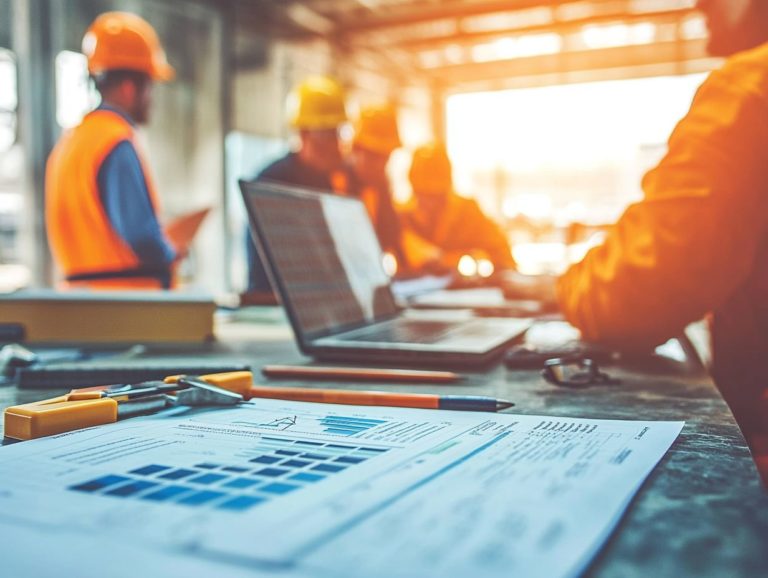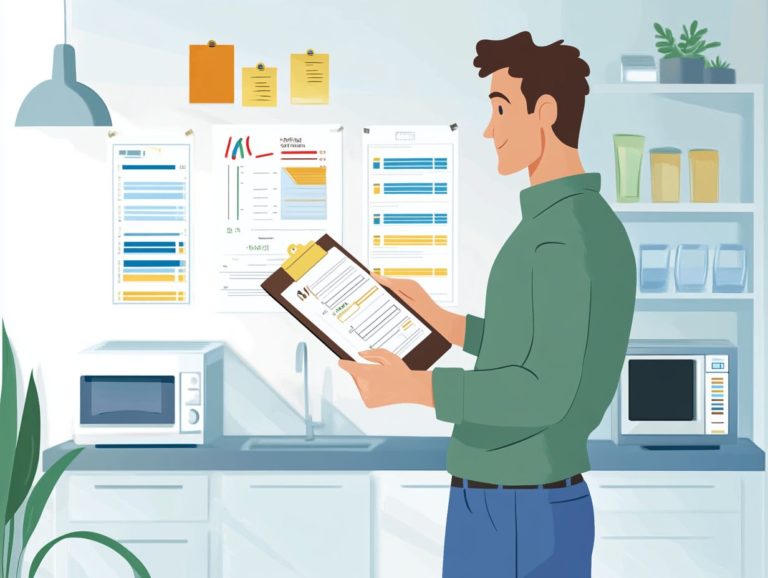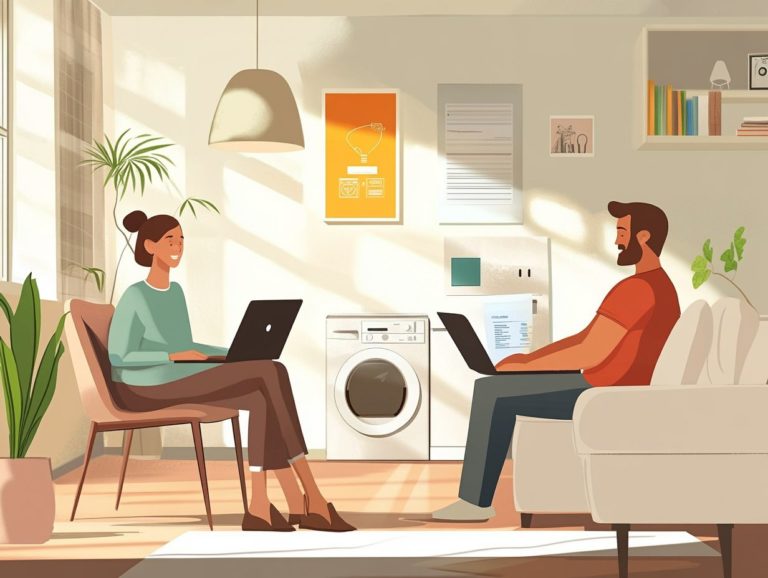The Connection Between Energy Audits and Home Value
In today s world, energy efficiency in homes is more than just a trend; it’s a crucial investment that serves both your interests as a homeowner and the well-being of the environment.
This article delves into the importance of energy efficiency, beginning with the indispensable role that energy audits play in uncovering opportunities for improvement. These audits not only enhance your comfort but also lower utility costs and elevate your home’s value.
From common upgrades to expert tips on choosing the right energy auditor, you ll discover all the insights necessary to make informed and impactful decisions for your home s future.
Contents
Key Takeaways:
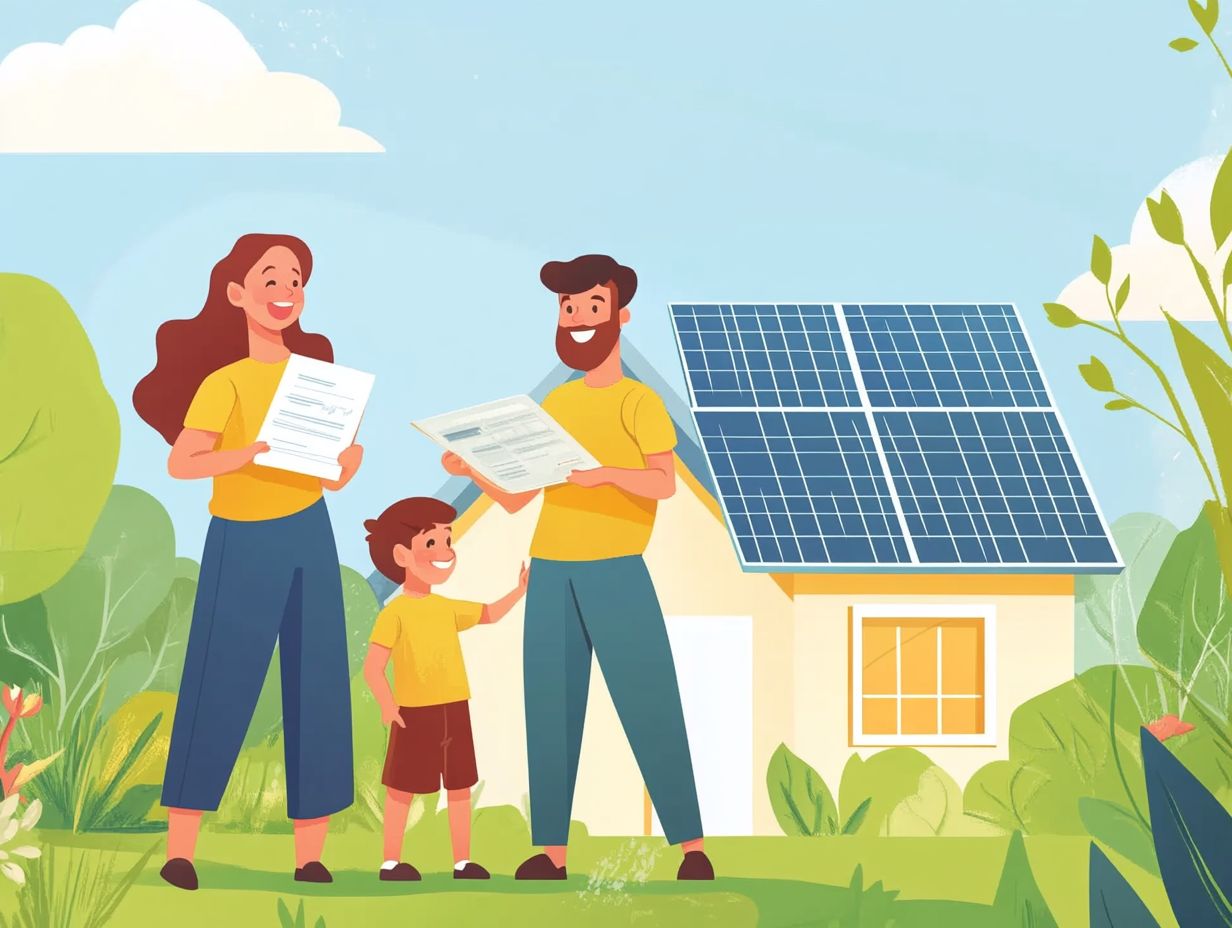
Investing in energy efficiency not only boosts your home’s value but also helps our planet!
Energy audits provide valuable information on a home’s energy usage and potential cost-saving improvements.
Improving a home’s energy efficiency can increase its value by reducing utility costs and enhancing its appeal to potential buyers.
The Importance of Energy Efficiency in Homes
Energy efficiency in your home is crucial for cutting down on electric bills and reducing your carbon footprint, all while elevating the comfort of your living spaces.
As you look to lower your energy consumption, grasping the importance of home energy audits becomes vital. A thorough energy assessment can pinpoint inefficiencies tied to insulation, heating, ventilation, and air conditioning (HVAC) systems, and overall energy use.
Not only do energy-efficient upgrades help you conserve resources, but they also lead to substantial savings on utility costs. They contribute to a healthier environment and even enhance your home s value. Adopting this holistic approach to energy conservation can yield significant benefits for both your finances and the planet.
Benefits for Homeowners and the Environment
You can unlock a wealth of benefits by embracing energy-efficient upgrades that elevate your living experience while making a positive impact on the environment.
By integrating energy-efficient appliances and home solar panels, you have the potential to significantly reduce your utility bills over time. Imagine how much you could save and redirect into other essential areas of your life.
These upgrades also enhance your quality of life and can increase your property value, making your home a more enticing prospect for potential buyers seeking modern, eco-friendly features.
Utilizing sustainable technologies is essential in lowering your carbon footprint and fostering a healthier planet. As your energy consumption decreases, you re not just easing the burden on energy resources; you re also benefiting your wallet, your community, and the environment as a whole.
Understanding Energy Audits
An energy audit is a meticulous evaluation of your home s energy consumption, crafted to pinpoint inefficiencies and suggest improvements in energy efficiency. Think of it as a roadmap for those looking to cut down on utility bills and shrink their carbon footprint.
It thoroughly examines various elements, including insulation, HVAC systems, and potential energy-efficient upgrades. You have the option to engage a professional energy auditor for a certified assessment or embark on a DIY journey using an energy audit checklist to evaluate your energy usage independently.
Gaining this comprehensive insight into energy assessments gives you the power to make informed choices about essential upgrades.
What is an Energy Audit?
An energy audit is a thorough evaluation process that reveals how energy is utilized in your home and identifies opportunities for optimization. This detailed examination not only delves into your energy consumption patterns but also assesses insulation, heating and cooling systems, and lighting efficiency.
Professional auditors are essential to this process, using an array of tools and techniques to identify energy losses. Typically, the audit kicks off with a walkthrough of your property, allowing auditors to observe your existing systems up close.
Following the initial inspection, specific assessments may be performed, including:
- Blower door tests to gauge airtightness
- Infrared cameras to uncover thermal leaks
These advanced methods yield valuable insights that give you the power to make targeted upgrades, ultimately reducing your energy costs and enhancing your home s sustainability.
The Process and Cost of an Energy Audit
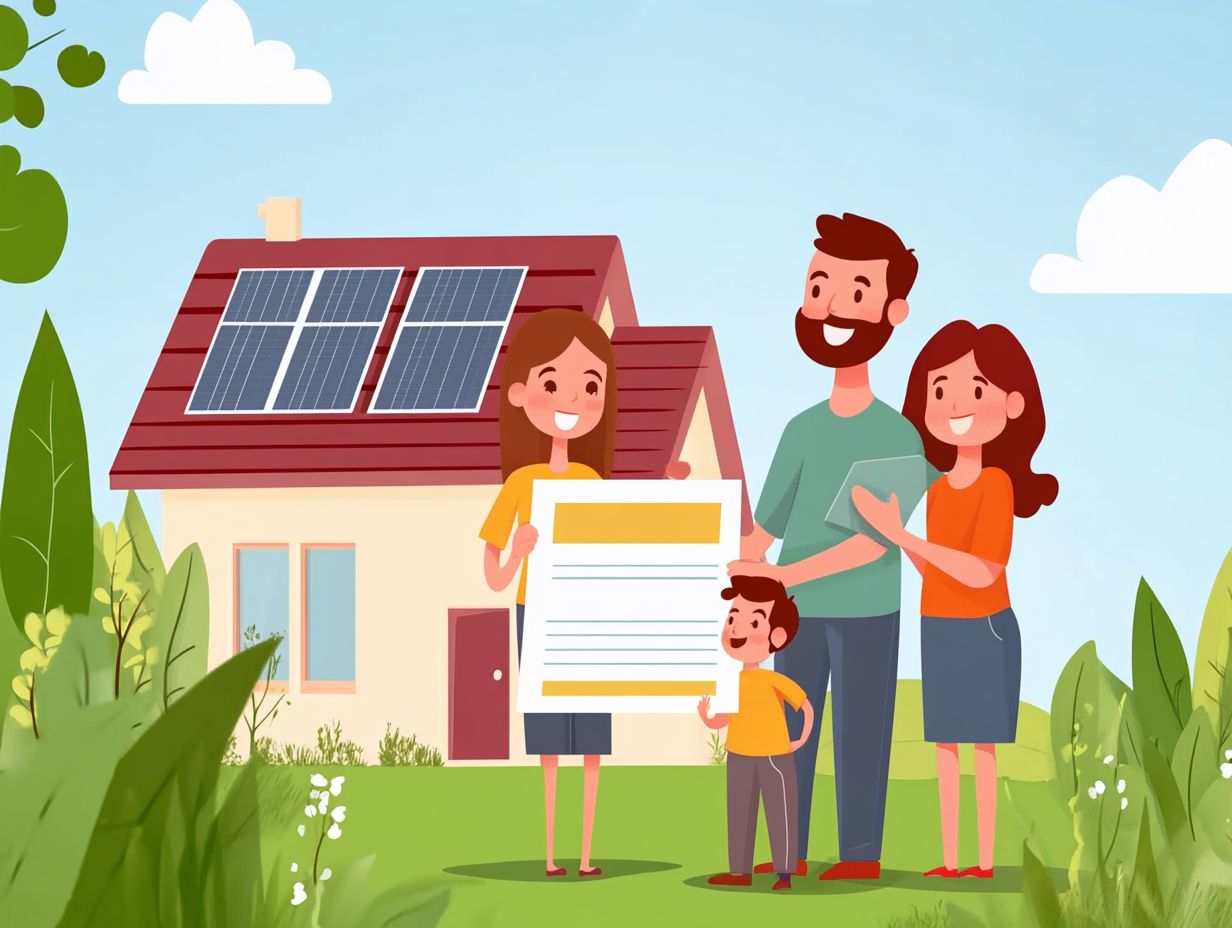
An energy audit consists of key steps. It begins with assessing your home’s systems to identify inefficiencies, such as air leaks and insulation issues.
At the end of the audit, you’ll receive a detailed report. It will suggest energy-efficient upgrades that suit your needs.
Energy auditors use specific tools during the assessment. Blower door tests, which check how well your home keeps air inside, and infrared cameras, which spot temperature differences, help find air leaks and thermal weaknesses in your home.
Blower door tests determine how airtight your home is. Infrared cameras show temperature variations that may indicate hidden issues.
Homeowners can expect to pay between $300 and $500 for an energy audit. The cost varies based on property size and audit complexity.
Following the auditors’ recommendations can lead to significant savings on your energy bills. You might recoup your investment within a few years.
This will enhance your comfort and reduce your environmental footprint.
How Energy Audits Affect Home Value
Imagine a home that not only saves you money but also attracts buyers like bees to honey! Energy audits boost your home’s energy efficiency and elevate its market value.
By showcasing impressive energy ratings, these audits create a compelling appeal for potential buyers, making your property more desirable in the competitive real estate market.
Factors that Impact Home Value
Several factors contribute to a home’s overall value, and energy efficiency stands out as a key player. By making various energy-efficient upgrades and ensuring your HVAC system is well-maintained, you can significantly boost your home’s appeal.
Location is another critical element in determining property values. Being close to schools, shopping centers, and public transportation can truly make a difference.
The overall condition of your home including its structural integrity, aesthetic charm, and functionality is essential as well.
Today’s buyers are increasingly drawn to homes with high energy ratings. They appreciate not only the potential for lower utility bills but also the commitment to sustainability that these homes represent.
By investing in energy-efficient upgrades like new windows, insulation, and solar panels, you can enhance your home s performance while elevating its market appeal, aligning it with the growing demand for environmentally friendly living.
How Energy Efficiency Improvements Can Increase Home Value
Implementing energy efficiency improvements not only reduces your overall energy consumption but also boosts your home s value, making it a savvy investment for anyone looking to enhance their property.
When you focus on specific upgrades like high-quality insulation, modern energy-efficient appliances, and advanced HVAC systems, you can significantly lower your utility bills while also appealing to potential buyers.
These enhancements contribute to a more sustainable living environment and provide a competitive advantage in the real estate market. Energy ratings serve as indicators of your home’s energy performance.
Buyers tend to prioritize homes with higher ratings, recognizing their long-term savings potential and the comfort they offer. This trend also influences sellers’ strategies, encouraging them to embrace energy-efficient solutions to attract more interest in their properties.
Types of Energy Efficiency Upgrades
You can implement a variety of energy-efficient upgrades in your home, from enhancing insulation to installing energy-efficient appliances and HVAC systems.
Each of these upgrades is designed to significantly reduce energy consumption and lower your utility bills.
Common Upgrades and Their Benefits
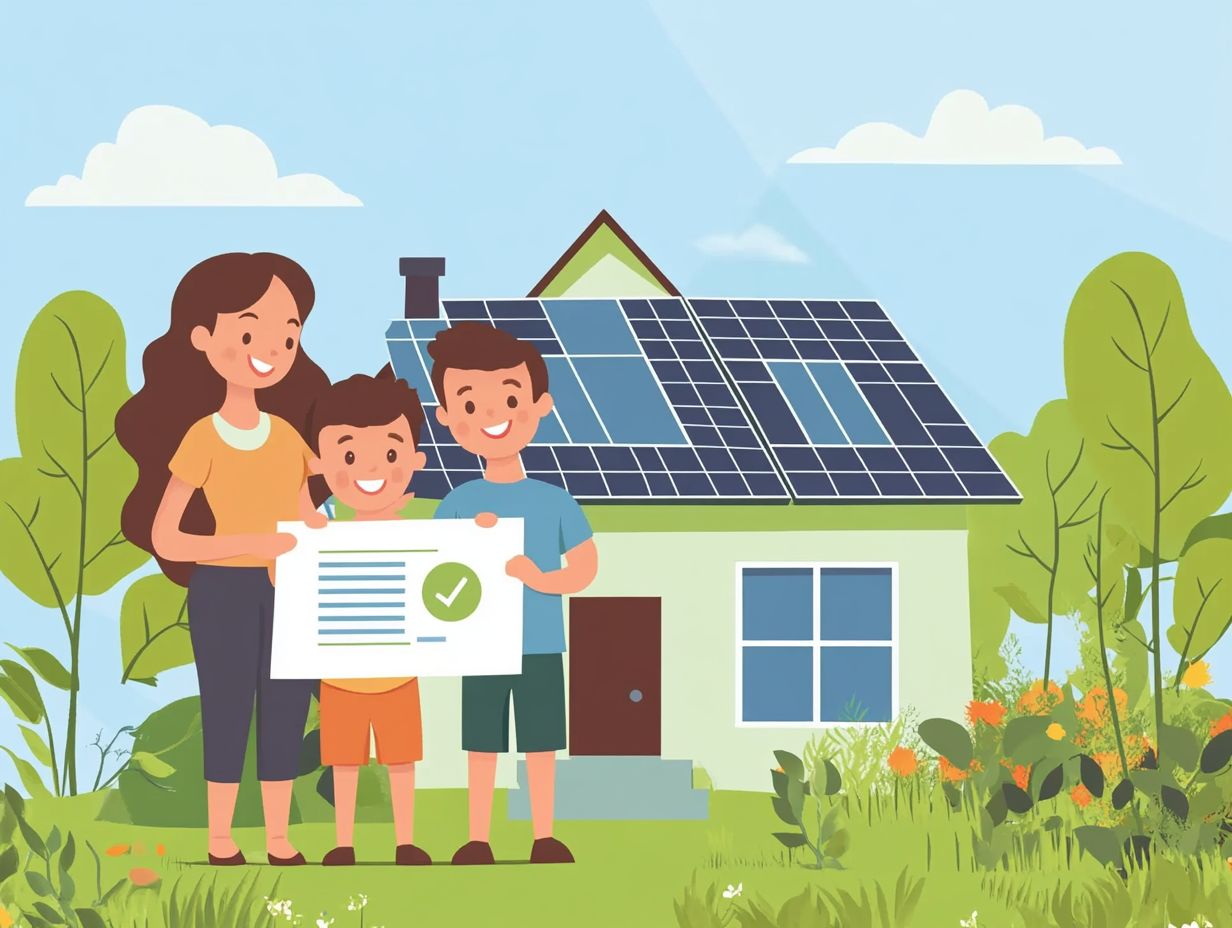
Common energy-efficient upgrades you might consider include installing high-quality insulation, investing in energy-efficient appliances, and switching to energy-efficient lightbulbs. Each of these steps can lead to significant reductions in energy consumption and cost savings.
Enhancing insulation in your attic and walls not only keeps your home cozy during the winter and refreshingly cool in the summer. It also trims down your heating and cooling costs over time.
Upgrading to Energy Star-rated appliances like refrigerators, washers, and dishwashers can further reduce your electricity bills while improving performance. Making the switch to LED lightbulbs can dramatically slash your lighting expenses, using up to 75% less energy than traditional incandescent bulbs.
These upgrades encourage a sustainable lifestyle and boost your property values, making them wise investments for any homeowner.
Choosing an Energy Auditor
Choosing the right energy auditor is essential for homeowners aiming to enhance their energy efficiency.
A skilled auditor offers invaluable insights and personalized recommendations derived from a detailed checklist for energy audits. This ensures you get the most out of your energy-saving efforts.
What to Look for in an Energy Auditor
When selecting an energy auditor, consider several key factors such as certifications, experience, and the thoroughness of their audit checklist.
A qualified energy auditor should hold relevant certifications from organizations like the Building Performance Institute (BPI) or the Association of Energy Engineers (AEE). These credentials showcase their expertise in energy efficiency.
Experience is equally crucial; an auditor with hands-on knowledge of various building types and energy systems will be better equipped to identify inefficiencies. This practical insight is invaluable for spotting areas where improvements can be made.
The auditor’s ability to communicate findings effectively enhances your understanding of necessary upgrades and potential savings. By choosing an auditor who embodies these essential qualities, you ensure a comprehensive assessment that can lead to meaningful energy savings and a more comfortable home.
Frequently Asked Questions
What is the connection between energy audits and home value?
The connection between energy audits and home value is clear: energy-efficient homes tend to have a higher value in the real estate market. The connection between energy audits and tax credits highlights how these assessments identify areas for improvement that can save homeowners money on their utility bills and increase the overall comfort and sustainability of the home.
How do energy audits affect home value?
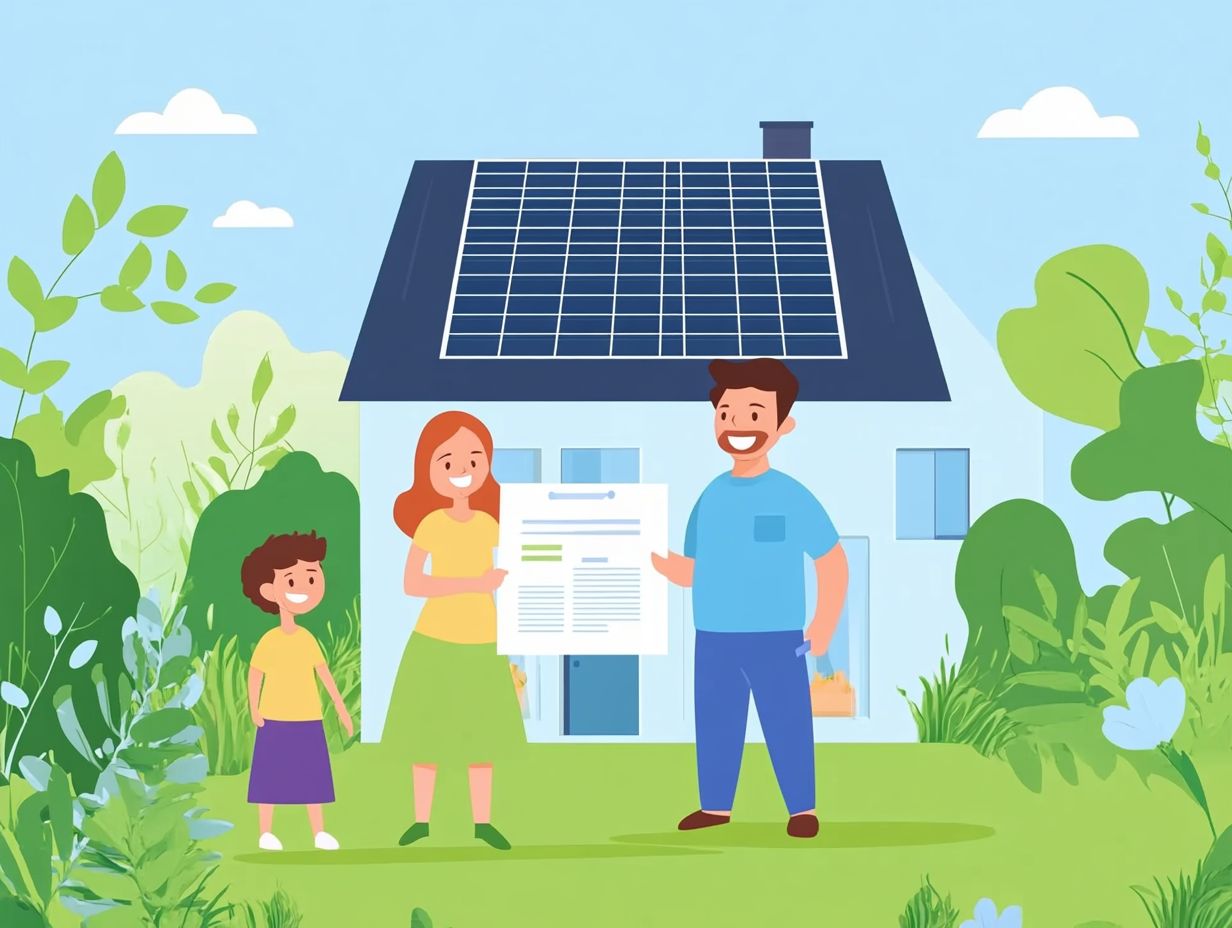
Energy audits can positively affect home value by identifying energy-efficient upgrades that can increase the home’s worth. For detailed insights, refer to understanding the cost-benefit of energy audits. These upgrades may include improving insulation, upgrading to energy-efficient appliances, and installing renewable energy systems.
Do energy audits increase home value?
Yes, energy audits can increase home value by making the home more energy-efficient and attractive to potential buyers. Understanding the link between energy audits and sustainability helps emphasize that a home with a high energy efficiency rating is seen as more desirable and can command a higher price in the real estate market.
What are the benefits of getting an energy audit?
Aside from potentially increasing home value, an energy audit has many benefits. It can help homeowners save money on their utility bills, increase overall comfort, and reduce their carbon footprint. It can also identify potential health and safety hazards, such as carbon monoxide leaks or poor indoor air quality.
How often should I get an energy audit?
It is recommended to get an energy audit every 3-5 years, especially if there have been any major changes to the home, such as renovations or additions. If you are experiencing high utility bills or discomfort in your home, it may be beneficial to get an energy audit sooner.
In summary, energy audits and upgrades are crucial for enhancing efficiency and boosting home value. Don’t wait consider taking action to improve your home today!
Can I perform an energy audit on my own?
While DIY energy audit kits are available, hiring a professional is a better choice. Professionals use special tools and have the expertise to assess your home’s energy efficiency accurately.
Their recommendations can significantly boost your home’s value, making it a worthwhile investment!




